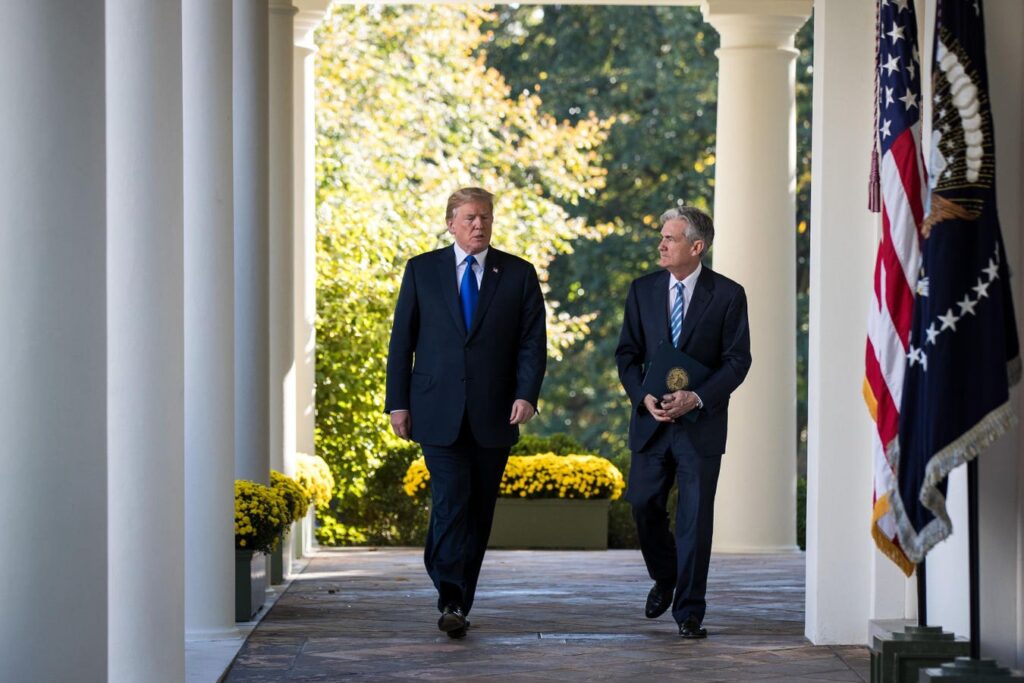WASHINGTON, DC – NOVEMBER 02: (L to R) U.S. President Donald Trump walks with his nominee for the … More
Getty Images
It’s no secret that Donald Trump does not like how Jerome Powell is managing the Fed and monetary policy. Despite nominating Powell for the job of Fed Chair in 2017, the President lambasts Powell (who Trump has nicknamed Mr. Too Late) every time the Fed’s Federal Open Markets Committee meets and doesn’t cut interest rates.
But President Trump should think again if he believes getting rid of Powell will get him what he wants. While the president is desperate for the Fed to cut interest rates, firing Powell before his term ends in eight months is no guarantee that rates would drop, and his departure would also likely rattle the financial markets.
Here are five reasons why it’s in the president’s interest to let Powell finish his term as Fed chair:
5. The President will probably lose in court.
Section 10 of the Federal Reserve Act states that the president can remove any member of the Fed’s Board of Governors “for cause,” such as neglect of duty, corruption, or inefficiency. But the head of the Fed cannot be removed for policy differences such as when to cut the Federal Funds Rate. This is why the Department of Justice is pushing forward with the investigation into the renovations of the Federal Reserve’s headquarters and whether it has been mismanaged. But Powell would likely fight any attempt to remove him, and without strong evidence of fraud, the court would either dismiss or issue an injunction. This could allow Powell to stay on the job until his term ends in May 2026.
4. If Powell is fired a Biden appointee will take over the Fed, temporarily.
If the courts don’t block the President from firing Powell, then Fed Vice Chair Philip Jefferson would become responsible for running the central bank until the Senate confirmed a new chair.
Jefferson was appointed by former President Joe Biden in 2022, and as acting Fed chair Jefferson would likely stay the course on interest rates, assuming no major changes in economic conditions. Jefferson would also be in charge of other policy matters, regulating banks, and the management of the Fed offices and staff.
3. The markets will react negatively.
The stock market has been on a roller roaster ride since Trump re-entered office in January. After steep losses in the first quarter of 2025, the market has largely recovered in response to the president’s retreat from his Liberation Day tariffs. But firing Powell would likely set the markets into a tailspin again.
Poll after poll has shown that the financial sector doesn’t want Trump to push Powell out. And leading bankers have been offering Powell support and warning of a market backlash should he be dismissed. Trump loves to cite a bullish market a sign he is managing the economy well. He would likely lose that message if he fires Powell.
2. Powell is historically good at his job.
Since 1954, the Federal Reserve Board’s policy-making Federal Open Market Committee (FOMC) has raised interest rates in a series of recurring steps 13 times. In five of them, the Fed has done this without putting the U.S. economy into a tailspin (soft landing), including twice under Powell’s leadership. No other Fed Chair has achieved this feat more than once. Furthermore, Powell and the Fed’s steady hand have countered the market anxiety created by the President’s aggressive trade policy.
1. Trump will lose his favorite economic scapegoat.
Many economists continue to predict that the U.S. economy will slow down given a number of headwinds:
The president’s push for higher tariffs;
Layoffs of federal employees and contractors — 135,000 firings and early retirements of federal employees, and tens of thousands of contractors to date;
And the flood of additional federal debt created by the recently enacted One Big Beautiful Bill Act.
Economic growth and job creation has slowed since Trump took office, with GDP contracting .5% in the first quarter of 2025. And there are some signs that inflation is starting to bubble up. Firing Powell would make it difficult to use him as a scapegoat should the economy go belly up.



